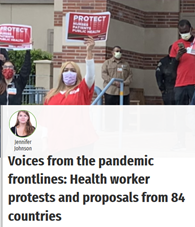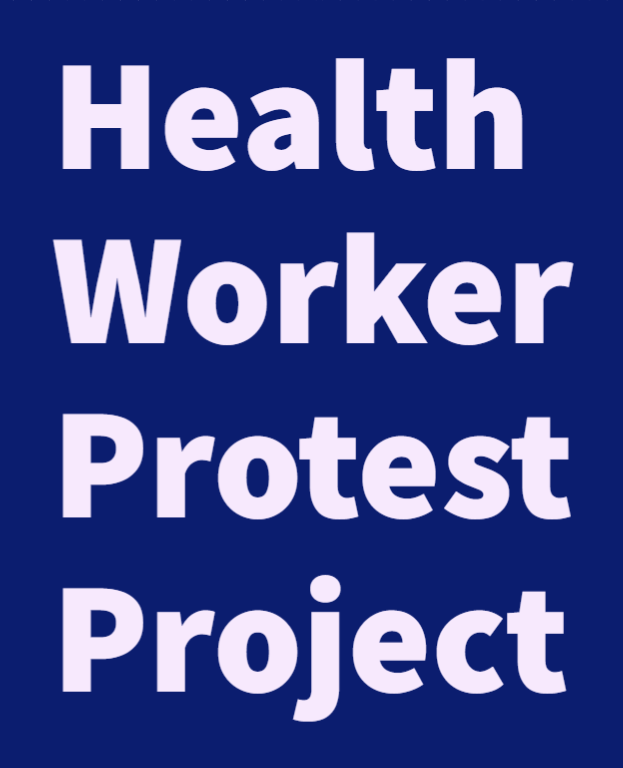[osd_social_media_sharing]

Voices from the pandemic frontlines: Health worker protests and proposals from 84 countries
Date: October 2020
Author(s): Jennifer Johnson
Publication type: Blog
Published by: From Poverty to Power (Oxfam)
Note: This piece by Jennifer Johnson was originally published on October 20, 2020 on Oxfam’s From Poverty to Power blog. This blog emerged from the Health Worker Protest Project launched by ARC in May 2020. The COVID-19 pandemic has put unprecedented strain on health care systems around the world. Frontline health workers have faced great risks, from lack of personal protective equipment (PPE) to discrimination and harassment. Some face repercussions for whistleblowing or walkouts. This evolving situation has given rise to a new wave of hundreds of innovative protests and proposals from health workers on the frontlines. The Health Worker Protest Project seeks to understand more about the relationship between health rights and the rights of health workers, as they risk their own lives to protect the lives of others. This pilot learning project is an open-source initiative to share and store reports of health worker protests around the world, launched in May 2020 by the Accountability Research Center (ARC). The project aims to learn from patterns that emerge when we see the international diversity of health worker protests and proposals. Five months in, we have received and collected over 600 reports from 84 countries, which we share on our twitter account @HealthWorkerPro. Reports of health worker protests and proposals are as diverse as the regions they come from, but common themes emerge:
Health workers in nearly every country have reported a dangerous lack of personal protective equipment, whether due to shortages or poor distribution. In one hospital in South Africa, nurses were given only one mask per week, and were expected to wash their own PPE at home despite potential risks to family. In India, an accredited social health activist (ASHA) community health worker reported being given only one mask in four months, despite having to interact with dozens of people each day as part of COVID tracking efforts. Health workers across the US have expressed concern at lack of supplies or being asked by hospitals to re-use PPE or use PPE that has been “sanitized” for re-use. Several who have refused or voiced concerns have been fired or faced retaliation. Health workers are facing threats not only from the virus, but from hospital administrations themselves. Health workers face risks outside of hospitals too. Multiple countries have seen health workers attacked or arrested by police for their protests. In Pakistan and Iran, protesting doctors and nurses were badly beaten by police. Police filed a report against ASHA workers for a peaceful sit-in protest on the grounds that it defied lockdown rules, despite the fact that these women were expected to interact with the public with almost no PPE and very little salary, the very reason they were protesting. In Malaysia, members of the National Union of Workers in Hospital Support and Allied Services (NUWHSAS) were arrested by the police for carrying out a peaceful protest against their employer. Reports emerged of police in Zimbabwe arresting nurses engaged in peaceful protests for a living wage. Doctors in Nigeria went on strike following continued harassment by police for violating lockdown orders to treat patients. Some health workers were attacked by police at Black Lives Matter protests in the United States, where many marched and kneeled in solidarity or volunteered as medics attending to protestors even after grueling hospital shifts at the height of the pandemic. Sadly, health workers around the world have faced violence and harassment from the general public in their own communities. In Mexico, health workers were forced off of public transport, and even out of their own homes, for fear that they were a source of contagion. Several nurses and doctors had hot coffee and bleach thrown at them. Health workers have reported being physically assaulted, in some cases by family members angry that they could not do more for a relative who had died from COVID. In India, ASHA health workers visiting coronavirus containment zones complained that they were “spat upon by some people, pelted with stones and abused at times while conducting surveys.” Despite the challenges they are facing, health workers are finding increasingly creative ways of raising their voices and protesting the abysmal working conditions. Many do it not just for themselves, but the patients they take care of every day. “If I get sick, who will take care of you?” asked Peruvian health workers at a protest demanding better working conditions. Several innovative protests stand out, from health workers in France holding a “dancing protest” for better working conditions, to a Doctor in India attending patients outside as a form of protest against non-functioning air conditioning and unhygienic conditions inside of the hospital. COVID-19 social distancing has made organizing protests harder, but online protests have allowed many health workers to express their concerns from a safe distance. The “naked doctor” protests of Argentina, France and Germany have seen health workers posing nude on social media as an allegory for how vulnerable and unprotected they are on the frontlines without adequate PPE. In the United States, National Nurses United held a socially distant vigil in front of the White House, laying out 88 pairs of empty white shoes in remembrance of nurses that had died of COVID-19. In Brazil, a country that has reported one of the highest numbers of nurses’ deaths, health workers stood 6 feet apart in their masks and white coats, holding crosses in memorial to their fallen colleagues. As the coronavirus pandemic rages on, health workers are still at risk. A recent report from Amnesty International revealed that over 7,000 health workers have died from COVID-19 around the world. There is still much to learn about the diversity and dynamics of health worker protests and proposals in the time of COVID-19, but one thing is clear: as health workers continue to raise their voices, we need to listen and act. There is no one more informed about the challenges faced in the coronavirus pandemic, and no one more crucial in fighting it worldwide. Help us bring these issues to global attention: to share health worker protest and proposal reports with the Health Worker Protest Project, please email healthworkerprotest@gmail.com tweet to @HealthWorkerPro or use the #HealthWorkerProtest hashtag

Jennifer Johnson is a Research Communications Consultant with the Accountability Research Center (ARC), an action-research incubator housed at American University in Washington, D.C. She is a graduate of American University with a BA in International Studies, and previously worked in communications at the International Maize and Wheat Improvement Center (CIMMYT) in Mexico. She is currently pursuing a Master of Sustainable Development Practice at the University of Florida.

